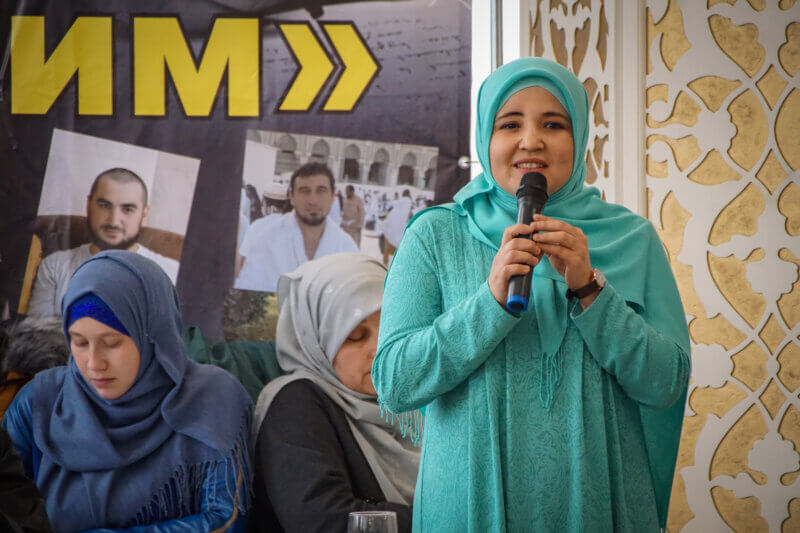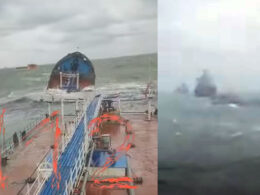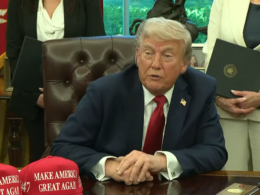On 27 July, a journalist at the Ukrainian media Graty Lutfiye Zudiyeva, was detained together with peaceful protesters at the gates of a court in occupied Crimea, where the highly contentious case of Crimean Tatar leader Nariman Dzhelyal was being considered.
Dzhelyal, Deputy Chairman of the Crimean Tatar Mejlis, a self-government organ of the indigenous minority of Crimea, which had fallen under severe Russian repressions since the occupation of the peninsula in 2014, was arrested on 18 February 2022 together with four others and accused of blowing up a gas pipeline. He is charged with sabotage and faces up to 20 years in prison.
According to Tetiana Kozak, a correspondent at Graty, Zudiyeva was not allowed entry into the court and was later detained. Additionally, 12 other Crimean Tatars, relatives, and friends of Dzhelyal, Asan Akhtemov, and Aziz Akhtemov, who are also accused of sabotage, were also detained when they attempted to attend the open session.
When Zudiyeva showed the police the press card and explained about carrying out an editorial assignment, she was ignored.
Zudiyeva was taken to the Zaliznychny District Police Department of Simferopol, where the police threatened her and tried to force her to give fingerprints and saliva samples. She refused.
As a result, the police issued an administrative report against the journalist, accusing her of "participation in a mass simultaneous stay of citizens in a public place near the Supreme Court of Crimea for the purpose of further media coverage." This incident confirms that the police were aware of Zudiyeva's status as a journalist, Tetiana Kozak said.
“She writes professionally, adhering to journalistic standards, consistently about the persecution of Ukrainian citizens in Crimea. Zudiyeva has been writing about the case of Nariman Dzhelal and the Akhtemov brothers since the beginning of the criminal prosecution. Today she planned to write about the end of this story,” Tetiana Kozak added.
According to Graty, Lutfiye Zudiyeva has been working with the media since its establishment in 2019.
Zudiyeva is also the coordinator of the Crimean Solidarity movement, a grassroots initiative of Crimeans who united to resist Russian repression.
There are strong grounds for considering the case trumped up: the detainees claimed that they testified under torture, the case was falsified, and the accusations were politically motivated.
Dzhelyal and his cousins were arrested and accused of sabotage shortly after the high-profile Crimea Platform conference, which Russia viewed as a threat. As the Deputy Head of the Mejlis, the representative body of Crimean Tatars, Dzhelyal is a prominent leader that Russia wants to silence. The flimsy nature of the evidence further suggests political targeting rather than legitimate prosecution. The only incriminating testimonies come from secret witnesses, which lawyers say are often individuals dependent on Russian authorities. Meanwhile, confessions were likely extracted through torture, with electric shocks used to coerce false admissions of guilt. Dzhelyal's lawyer has explicitly stated this case exemplifies Russia "apply[ing] all the spectrum of ‘achievements’ of the recent years" against dissidents.
In the broader context, the entire criminalization of the Mejlis by Russia has been internationally condemned as political repression. Russia banned this self-governing body of Crimean Tatars in 2016 after its peaceful resistance to Russia's occupation. The UN International Court of Justice ordered Russia to reverse the ban, which it has defied.
Experts view attempts to silence Dzhelyal and other Mejlis leaders as consistent with Russian policy to repress symbols of Crimean Tatar identity and self-governance.
Related:
- How Russia fabricated the case against Crimean Tatar leader and political prisoner Dzhelyal
- How Crimean Tatar leader Dzhelyal swelled the ranks of Ukrainian 'saboteurs'
- Crimean Tatar leader Dzhelyal kept in unheated Russian prison
Read Zuftiye's Zudiyeva's column about the Crimean Tatar deportation:
Time for world to recognize Stalin’s deportation of Crimean Tatars as genocide – activist





